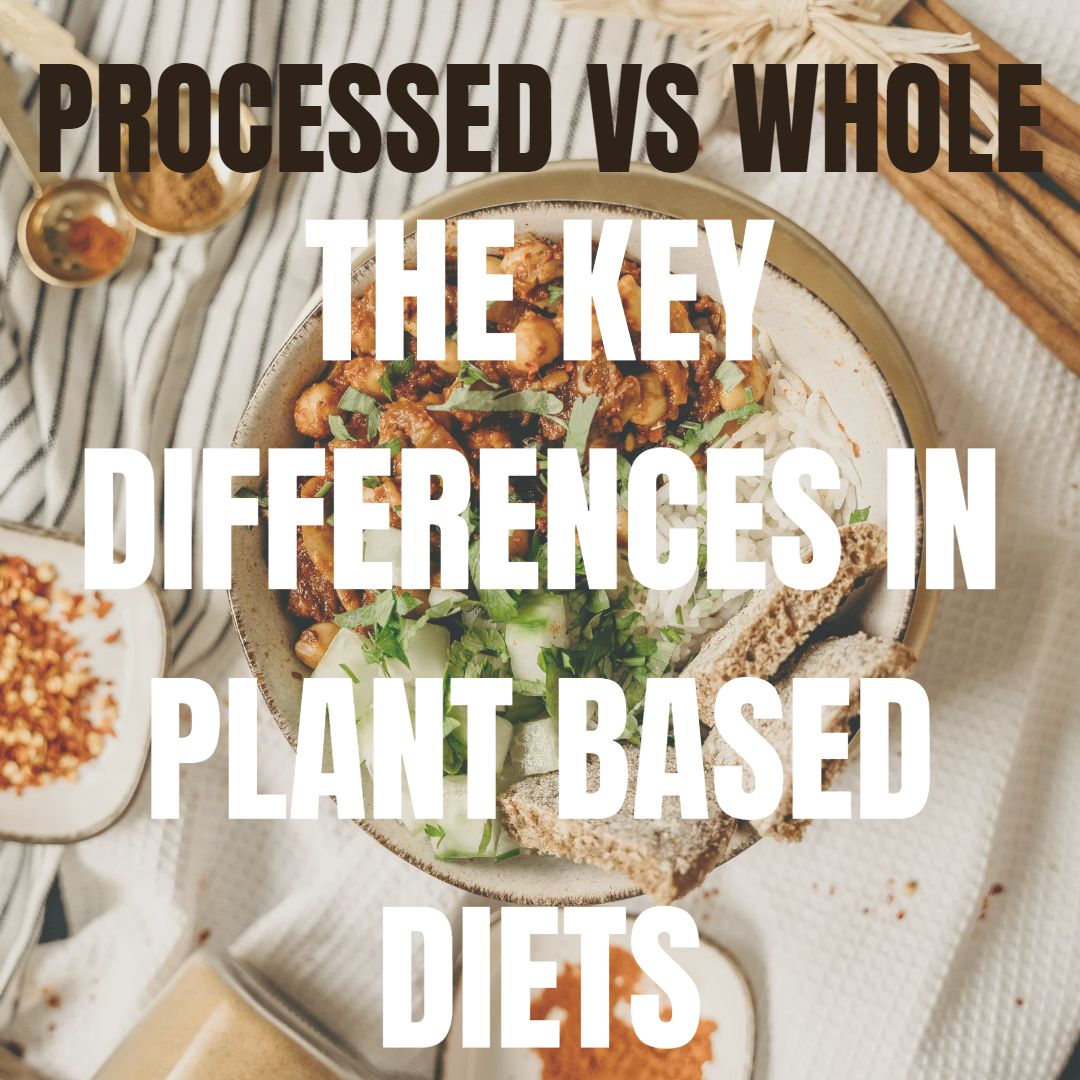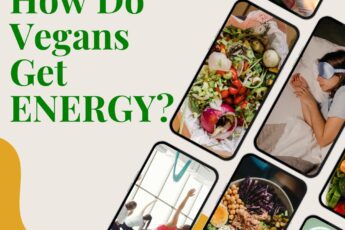Whole foods vs processed foods is one of the biggest distinctions to understand when following a plant-based diet. While cutting out animal products is a great first step, the real difference in long-term health often comes down to the quality of the plant-based foods you choose. A whole foods plant-based diet (WFPB) focuses on foods close to their natural state – packed with nutrients, fiber, and flavor – while a diet heavy in processed foods, even vegan ones, can be lower in nutrition and higher in added sugars, sodium, and unhealthy fats. Knowing how to navigate processed vs whole foods can help you build a plant-based lifestyle that supports your health, taste buds, and long-term success.
What Are Whole Foods vs Processed Foods?
Whole foods vs processed foods isn’t just a plant-based topic. Whole foods are simply those that stay close to their natural state, with minimal processing. You’ve probably heard of diets like Paleo, Mediterranean, Whole30, or DASH. They don’t cut out animal products, but they all focus on eating mostly whole, unprocessed foods.
Here are some common examples of whole foods:
- Fresh fruits
- Vegetables
- Whole grains
- Nuts
- Seeds
These foods keep their essential nutrients, fiber, and natural flavors.
On the flip side, processed foods are those altered from their original form. Some processing, like freezing or canning, isn’t necessarily bad. But when foods get preservatives, artificial ingredients, or lots of added sugars, sodium, and unhealthy fats, they stop being healthy. Think packaged snacks, ready-to-eat meals, and refined grains.
While some processing adds convenience and helps preservation, highly processed foods usually lose nutrients and add unwanted ingredients. Knowing the difference between processed vs whole foods is key to making better dietary choices—whether you follow a plant-based diet or not.
Whole Foods in a Plant-Based Diet
When it comes to a plant-based diet, whole foods are the stars of the show. These are plant-based foods that are minimally processed and stay close to how nature intended. They’re loaded with the nutrients, fiber, and antioxidants your body needs to thrive.
Whole foods on a plant-based diet typically include:
- Fresh fruits and vegetables
- Whole grains like brown rice, quinoa, and oats
- Legumes such as beans, lentils, and chickpeas
- Nuts and seeds
Eating mostly whole foods means you avoid added sugars, unhealthy fats, and artificial ingredients often found in processed options. This approach supports overall health and sustainability, making your plant-based lifestyle both nourishing and eco-friendly.
Processed Foods in a Plant-Based Diet
Not all processed foods are created equal, especially on a plant-based diet. Some are minimally processed, like canned beans, frozen vegetables, or tofu, which can be convenient and still nutritious. But others are highly processed—think vegan burgers, plant-based cheeses, snack bars, and frozen meals.
These highly processed plant-based foods often contain added sugars, unhealthy fats, sodium, and artificial ingredients. Relying too much on these options can reduce the overall health benefits of your diet and lead to nutritional gaps.
Understanding the difference between minimally processed and highly processed foods helps you make smarter choices. Aim to prioritize whole and minimally processed foods while enjoying processed options in moderation for convenience and variety.
Finding Balance Between Convenience and Health
Processed foods offer undeniable convenience. They make meal prep faster and help on busy days. However, that convenience often comes with a trade-off, many processed foods contain added sugars, unhealthy fats, and extra sodium that can hurt your health.
On the flip side, preparing meals with whole foods like fresh fruits, vegetables, whole grains, and legumes leads to better nutrition and supports overall well-being.
The good news? You don’t have to choose one over the other. Start by taking a self-assessment like this PLANT-BASED ROADMAP to clarify your goals and priorities for living a plant-based lifestyle. From there, finding balance becomes easier—include minimally processed foods like pre-washed salads, frozen vegetables, and canned beans, and combine them with batch cooking and meal prepping to save time without sacrificing nutrition.
In addition to balance throughout the day, here are two simple plans to help you find that balance:
Plan 1: Keep It Simple During the Week
- Stick to basic, healthy meals for breakfast and lunch – like oatmeal with fruit or a big salad.
- For weeknight dinners, focus on whole food favorites like hearty soups, stir-fries, or roasted veggies with grains.
- Save convenience and indulgence for the weekend, such as enjoying a vegan burger or a plant-based frozen meal.
Plan 2: Mix Convenience and Whole Foods Throughout the Day
- Use minimally processed items like canned beans, frozen veggies, and pre-washed greens to speed up cooking.
- Batch cook whole food meals on your day off to have ready-to-eat options all week.
- Allow yourself the flexibility to include occasional plant-based snacks or treats for variety and satisfaction.
With either plan, the key is to listen to your lifestyle needs and goals. A balanced approach helps you enjoy the best of both worlds, convenience and nutrition, without feeling restricted.
Resources for a Whole Foods Plant-Based Diet
A great resource to learn more about a whole foods plant-based diet is the FORKS OVER KNIVES franchise. From the bestselling book, Forks Over Knives: The Plant-Based Way to Health by Gene Stone and T. Colin Campbell, to the eye-opening 2011 documentary Forks Over Knives (a must-see for every plant-based eater), to their active Facebook community, Forks Over Knives Official Plant-Based Group, this collection offers a wealth of information and inspiration.
Many recipes on our website, ORGANIZINGAPLANTBASEDLIFE.COM, align with the whole foods plant-based approach. For example, the simple and delicious MEDITERRANEAN SWEET POTATOES features creamy sweet potatoes, protein-packed roasted chickpeas, and a homemade tahini sauce. Another favorite is our HEARTY LENTIL SOUP, loaded with lentils, potatoes, and sweet carrots.
The Best Way to Incorporate Plant-Based Swaps
Finding a balance between whole foods and processed options often means discovering smart PLANT-BASED SWAPS. There’s a helpful guide to alternatives for many traditional foods, showing that just because you follow a plant-based diet doesn’t mean you have to be perfect.
You can easily swap everyday foods for tasty plant-based versions that fit your lifestyle and taste preferences. Keep in mind, though, that not all swaps are equally healthy. Some are whole-food-based and highly nutritious, while others are more processed and best enjoyed in moderation.
Many swaps aren’t unhealthy – take tofu, for example, which is a whole food and nutrient-rich. On the other hand, some options like vegan burgers tend to be more processed and less nutritious. The key is to check the ingredient list and nutrition facts on packaged foods to decide what fits best with your health goals.
Some common swaps include:
- Dairy alternatives like almond milk, oat milk, or cashew cheese
- Plant-based “meats” such as tofu, tempeh, or more processed options like vegan burgers
- Vegan desserts that satisfy sweet cravings without animal ingredients
Remember, this is your journey. You might have busy days when a quick, processed meal works best, or times when you want an indulgent treat that feels like a favorite comfort food. The key is making choices that fit your lifestyle and health goals without feeling restricted.ys when a quick, processed meal works best, or times when you want an indulgent treat that feels like a favorite comfort food. The key is making choices that fit your lifestyle and health goals without feeling restricted.
Key Takeaways for a Balanced Plant-Based Diet
Understanding the difference between whole foods and processed foods is essential for making smart choices on a plant-based diet. While whole foods provide the nutrients and fiber your body needs, processed options can offer convenience and variety when used thoughtfully.
Finding your own balance is the key. Whether that means simple, nutrient-rich meals during the week and more indulgent options on weekends, or mixing minimally processed foods with whole foods daily, the best approach fits your lifestyle and goals.
Start small, listen to your body, and enjoy the journey. Every healthy choice counts and brings you closer to a sustainable, nourishing plant-based lifestyle.






